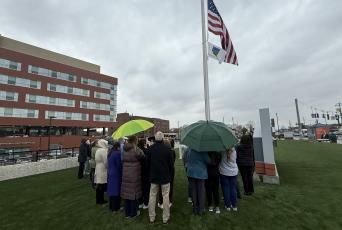
Surgical Care
General Surgery
A general surgeon treats disease, injury and deformity through surgical procedures. The surgeons at our New York based surgical care and recovery center, provide skilled emergency and planned surgical procedures, as well as diagnostic and preventative testing and outpatient services.
Procedures before Surgery
The patient (or someone authorized to sign for the patient) must sign a consent form for surgery. Patients under age 18 (and not married) must have the signature of a parent or legal guardian.You may not eat or drink after midnight of the night before your surgery, unless your surgeon tells you otherwise. You should remove your jewelry, makeup, nail polish, glasses, and dentures. You will not be allowed to drive home after surgery. Be sure to arrange to have a family member or friend drive you home.
In the Operating Room
A staff member with our surgical care and recovery center in New York will take you into surgery. When in the operating room, the anesthesiologist will give you the anesthetic and monitor you throughout the procedure.
Post Anesthesia Care Unit (PACU)
Immediately after your surgery, you will be taken to the Post Anesthesia Care Unit. To protect the privacy of other patients, family members are not permitted in PACU, with the exception of the parents of children having surgery.
Anesthesia Service
An anesthesiologist or nurse anesthetist will explain the anesthetic procedures to the patient prior to surgery. This service will be billed separately.
Going Home
Your physician is the only one who may complete the discharge order for you to go home. Our staff will aid in any home care arrangements that may be necessary. Prior to your leaving, the doctor or nurse will give you instructions for continued care at your home.
Visitors
Visitors will be able to wait for you in our ambulatory surgery waiting area at our New York surgery care and recovery centers. Please limit the number of your visitors to just one; children should be left at home.
A member of our staff will keep your visitor apprised of your progress, and will notify your visitor when you are taken to the recovery area and when your visitor can see you.
Please remind your visitors to remain in the waiting area or to leave word at the desk if they must leave. This will keep communication lines open and prevent unnecessary delays when you’re ready to leave.
Because your surgical preparation, procedure and recovery may take several hours and require outpatient services in our New York based recovery center, we recommend that your visitors bring something quiet to occupy themselves with while they wait.
Surgical Care at UHS Chenango Memorial Hospital
You can rely on the General Surgery Department at UHS Chenango Memorial Hospital in New York when surgery is the best option. The surgical department provides skilled emergency and planned surgical procedures, as well as diagnostic and preventative testing.
Procedures like annual colonoscopies can be scheduled and performed quickly and easily through the UHS Chenango Memorial surgical department.
Chenango Memorial Hospital’s General Surgery Department
4 Newton Avenue
Norwich, NY 13815
(607) 337-4970
For Your Safety:
Your safety is a primary concern. As a result of your illness or surgery, you may find that you have less strength. This, combined with being in an unfamiliar environment, can increase your chances of falling. Please help us to prevent accidents in our New York surgery care centers by following these guidelines:
- Never get into or out of your bed by yourself unless you have been advised by your doctor or nurse to do so. Please ask your nurse for help if you need it.
- Always wear well-fitting slippers. Do not go barefoot.
- Turn on the light; don’t walk in the dark.
- Sit on the side of the bed for a moment before standing. If you feel weak or dizzy, do not get up by yourself. Call a nurse for assistance.
- Keep the side rails on your bed raised. They are useful for shifting positions and will protect you from falls.
- Do not attempt to get into or out of a wheelchair by yourself. Please let your nurse help you.
- Do not be disturbed if you hear an alarm. For your safety, we periodically check our fire alarm system and staff preparedness.
What you need to know:
Prior to Your Surgery
Scheduling the Surgery/Procedure
Your surgeon’s office will contact the hospital/surgery center to schedule your procedure, and will then inform you of the date and time.
Pre-Admission Testing
Your surgeon’s office will let you know if you’ll need any pre-admission testing.
Paperwork
Please bring any insurance forms, the surgical consent form, test forms and any other physician-requested documents with you to your pre-admission testing appointment if your doctor orders this type of testing for you. If you’re not required to come in for pre-admission testing, please bring the papers with you on the day of your surgery.
Instructions Before Surgery/Procedure
- Don’t eat or drink anything after midnight the night before your procedure.
- Please be sure to find out from your doctor if you should take your regular medications (including over-the-counter medications, vitamins and any supplements) the morning of your surgery/procedure.
- Bring a list of all medications you’re currently taking with you to the hospital/surgery center. This includes prescription and over-the-counter medications, vitamins, herbs, etc. Be sure you know the name, dosage (how much you take) and schedule (how often you take them) for each.
- If there is a change in your physical condition such as a cold, fever or cough, notify your surgeon as soon as possible.
- Wear loose, comfortable clothing.
- Don’t wear makeup, perfume, hairspray or anything else with alcohol in it.
- Leave all valuables and jewelry at home.
- If you have piercings, please remove all jewelry from them.
- Don’t wear contact lenses to your surgery; however, you may keep glasses with you.
- Arrange a ride home beforehand with a responsible adult.
On the Day of Your Surgery
Where to Go
- If you’re having surgery at the new Ambulatory Surgery Center at Wilson Place, you should report there at the time your physician instructs you to.
- If you’re having ambulatory surgery at Chenango Memorial Hospital or Delaware Valley Hospital, you should report to that hospital’s Admissions/Registration office at the time your physician instructs you to. In both locations, this office is located just off the hospital’s main lobby.
What Happens Next
- You will be asked to change into a hospital gown.
- You should remove any dentures or contact lenses. If you wear glasses, you may leave them on. They will be removed during your procedure and placed in a protective holder.
- Our staff will have you sign a surgical consent form if you haven’t already done so. (See below)
- A nurse will review your history, take your temperature and blood pressure, and record your height and weight.
- If you are to have anesthesia, an anesthesiologist or nurse anesthetist will visit you. (See below)
- You will be taken to the operating room where the operating room nurse will check your ID band, verify the procedure to be done, and explain the preparation.
Children Having Surgery
Your child may bring a favorite toy or blanket from home to accompany him/her into surgery. We encourage both parents of pediatric patients to remain at the hospital/surgery center throughout the procedure.
Mini-Procedures
Mini-procedures are minor surgical procedures that can be performed under local anesthesia. Pre-admission testing isn’t required if for mini-procedures. Your physician's office will contact the hospital to schedule this. On the day of the procedure, please arrive at hospital/surgery center no later than one hour before your scheduled procedure so you can complete our forms.
Consent Forms
Before surgery, we’ll ask you to sign a form indicating that you haven’t had anything to eat or drink since midnight and that you give the hospital your permission to carry out the procedure. Adult patients give their own written consent; parents/guardians must give permission for patients under 18. If you have power of attorney, be sure to bring the paperwork stating this.
Anesthesia
Before surgery, an anesthesiologist or nurse anesthetist will visit you to ask questions about your general health, medical problems (especially heart and breathing problems), prior anesthetics and all medications you’re taking. Please have this information available.
Before you receive general anesthesia, you may be given medications orally or intravenously in the ambulatory surgery holding area to decrease the acidity of your stomach contents and reduce your nausea.
Delays
Occasionally surgeries/procedures are delayed due to unforeseen circumstances. If this happens, a member of the nursing staff will explain the nature of the delay.
Following Your Surgery
Recovery
After your surgery/procedure you’ll spend time in the recovery area under the care of a specially trained registered nurse. You’ll stay at the hospital/surgery center until your condition is stable and it’s safe for you to leave. Keep in mind that after general anesthesia, you may feel temporarily drowsy or nauseated.
Discharge Instructions
A member of the nursing staff will give you instructions about post-hospital care. If you have questions about your diet, activities or other matters, or aren’t comfortable with your discharge instructions, please be sure to ask at this time. You will receive written discharge instructions prior to leaving the hospital/surgery center. Please keep these instructions and refer to them when you leave since they have important information regarding your post-surgical care.
Going Home
Following surgery, you won’t be allowed to drive yourself home, so please have someone available to do this. We also urge you to avoid tasks that require skill, coordination or judgment (such as driving, operating machinery or making important decisions) for 24 hours following surgery.
Hospitalization
In the unlikely event your surgery/recovery requires hospitalization, your physician will make arrangements for your admission. If your surgery is performed at the Ambulatory Surgery Center at Wilson Place, an ambulance will take you from the center to the hospital for admission.
UHS News
-
 Know where to go for your medical concernApril 14, 2025
Know where to go for your medical concernApril 14, 2025It can be tough to distinguish where to go for medical care when your symptoms feel unbearable, and your primary care provider is unavailable. Here are some key differences to help you decide.
-
 Guided by instinct, healed by expertise — orthopedic care close to homeApril 14, 2025
Guided by instinct, healed by expertise — orthopedic care close to homeApril 14, 2025Ever since she was a little girl, Kaylee Goodspeed has been involved in cheerleading. However, as she grew older, she started developing issues with her knees that, if not cared for properly, could have caused problems in the future. With her mother’s advocacy and an expert team of UHS Orthopedic surgeons, Kaylee is now cheering, tumbling and living a normal life once again.
-
 Flag-raising held to commemorate Donate Life MonthApril 10, 2025
Flag-raising held to commemorate Donate Life MonthApril 10, 2025UHS held a flag-raising ceremony at UHS Wilson Medical Center on April 10 to commemorate National Donate Life Month, a celebration of those who have given the gift of life through organ, eye and tissue donation.
-
 Empty Bowls event raises over $8,000 to support hunger reliefApril 10, 2025
Empty Bowls event raises over $8,000 to support hunger reliefApril 10, 2025A huge THANK YOU to everyone who attended the 2025 Empty Bowl Events and showed their support for hunger relief in our area. or every ticket sold, the Food Bank provides 75 meals to the hungry in the Southern Tier!


